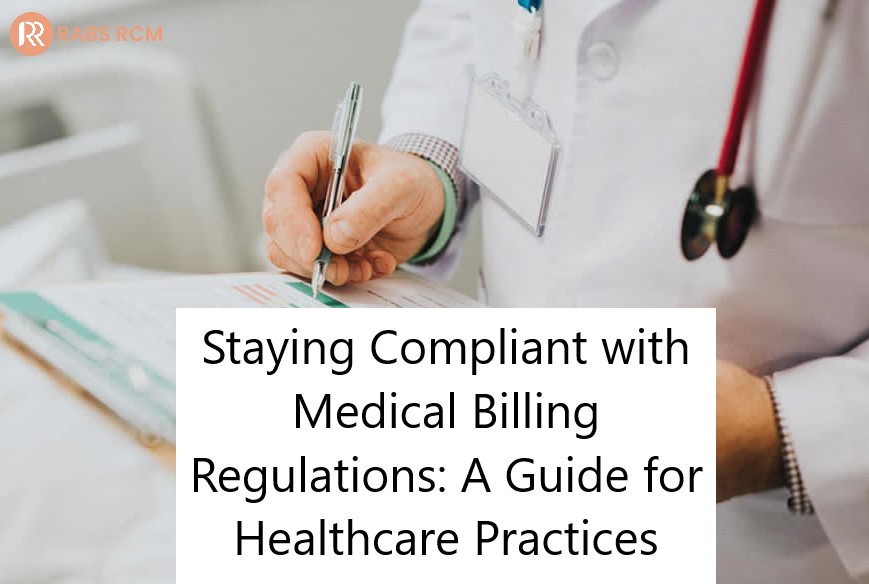
Staying Compliant with Medical Billing Regulations: A Guide for Healthcare Practices
In the complex landscape of healthcare, the accuracy of medical billing plays a pivotal role in ensuring the financial stability of your practice. However, medical billing compliance is a constantly evolving and intricate area that demands your utmost attention. Failure to comply with medical billing regulations can lead to adverse consequences, including reimbursement denials, fines, penalties, and even legal actions. To navigate this challenging terrain, it’s imperative to remain updated on federal, state, and private insurance laws and guidelines, as they are subject to frequent changes.
The Significance of Medical Billing Compliance
Medical billing compliance is not just a box to check; it’s a critical aspect of healthcare that carries profound consequences. Non-compliance can lead to legal actions, financial penalties, and damage to your practice’s reputation. Patients prioritize quality care and often choose healthcare providers with a clean compliance record.
To underscore the importance of medical billing compliance, consider these key factors:
- Preventing Fraud and Abuse: The primary objective of medical billing compliance is to prevent fraudulent or abusive practices toward patients. It serves as a safeguard for both patients and providers.
- Ensuring Patient Privacy and Safety: Compliance regulations, such as the Health Insurance Portability and Accountability Act (HIPAA), are designed to protect sensitive patient information, maintaining their privacy and safety.
- Safeguarding Information: In addition to patient privacy, compliance regulations ensure the safeguarding of valuable information, including lab forms, insurance statements, collection notices, and prescription forms.
- Accurate Billing Procedures: Compliance guidelines meticulously outline the proper procedures for billing patients accurately, reducing the likelihood of errors.
Furthermore, adherence to medical billing and coding regulations plays a crucial role in mitigating the risk of cyberattacks and data breaches. It also positions your practice as a reputable healthcare provider committed to protecting patients and complying with federal laws and regulations.
5 Medical Billing Best Practices for Ensuring Compliance
To ensure a smooth medical billing and reimbursement process, consider these best practices:
- Monitor and Track Compliance: Keeping a close eye on compliance is vital for the effective functioning of your practice. Embrace technology tools such as billing systems, provider credentialing software, medical coding platforms, and payer contract review solutions to maintain confidence in your compliance efforts.
- Streamline Clinical Workflows: The HIPAA guidelines established national standards for safeguarding protected health information (PHI). Streamlining clinical workflows ensures that only authorized individuals can access specific information, reducing the risk of unauthorized disclosure.
- Audit Your Internal Processes: Consider hiring a third-party auditor to review your medical billing and coding procedures through internal audits. This proactive approach identifies high-risk areas, workflow inefficiencies, and potential improvements, enhancing your compliance practices.
- Establish Procedures, Policies, and Schedules: Maintain well-defined policies, procedures, and schedules in your practice’s handbook to uphold medical billing compliance. Integrating quality improvement goals and patient safety programs into employee evaluations and incentives further enhances your compliance efforts.
- Identify and Assess Risks: Cybersecurity risks are a constant concern in healthcare. Engage external consultants to assess your practice for hidden compliance risks and provide valuable insights and advice to mitigate vulnerabilities.
Laws Regulating Healthcare Compliance
Several crucial laws regulate the healthcare industry to protect patients and ensure fair access to healthcare services. Here are some notable ones:
- Health Insurance Portability and Accountability Act (HIPAA): Prevents the sharing of private patient information without consent or knowledge.
- Health Information Technology for Economic and Clinical Health (HITECH) Act: Expands HIPAA and sets standards for implementing electronic health records (EHR) in healthcare facilities.
- Emergency Medical Treatment & Labor Act (EMTALA): Ensures that everyone can receive emergency medical treatment regardless of their ability to pay.
- Patient Safety and Quality Improvement Act (PSQIA): Encourages the reporting and resolution of patient safety issues and establishes a database of Patient Safety Organizations (PSOs).
In conclusion, staying compliant and up to date with rules and regulations will contribute a great deal to your practice. Not only will it increase trust and reliability but will also improve your overall reputation.

Precision. Performance. Partnership.
Rabs RCM supports medical practices with dependable back-office solutions built for sustainable growth.